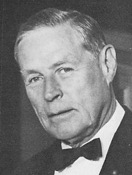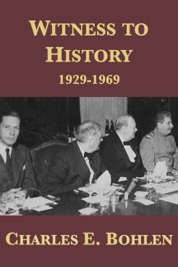
Under Truman (1945-1952), Bohlen worked as a special assistant for three Secretaries of State: James Byrnes, George Marshall (whom he revered) and Dean Acheson, becoming Counselor, the fourth ranking position in the State Department, in 1947. His was involved in all the major events and crises of the early Cold War including the Marshall plan, the Berlin blockade and the formation of NATO.
In 1953, President Eisenhower named Bohlen Ambassador to the Soviet Union. His confirmation turned out to be highly contentious because of Bohlen’s association with Yalta, but Eisenhower stuck by him. In Moscow, Bohlen was a keen and acute observer of post-Stalin developments in the Soviet Union, but his difficult relationship with Secretary of State John Foster Dulles kept him sidelined from any meaningful policy role and he felt underutilized.
In 1957, Dulles maneuvered him out of Moscow and sent him off to virtual exile as Ambassador to the Philippines. In 1959, Dulles’s successor Christian Herter brought Bohlen back to the State Department as a special adviser on Soviet affairs, a role he retained for a time after the election of John F. Kennedy who named Bohlen Ambassador to France in 1962, a position he filled with distinction at a time of difficult relations between de Gaulle and the United States. He served briefly as Deputy Under Secretary for Political Affairs in the State Department.
Bohlen was considered, on a par with George Kennan, as the top Soviet specialist of his generation: when he retired in 1969, he had more years of direct experience dealing with Soviet officials than anyone else in the US government (he once calculated that he had spent over 2000 hours sitting across a table from Soviet Foreign Minister Vyacheslav Molotov). Bohlen’s memoir Witness to History was published in 1973 with extensive help from Robert Phelps. He died of cancer the following year.
Click on the cover for details about the eBook:




